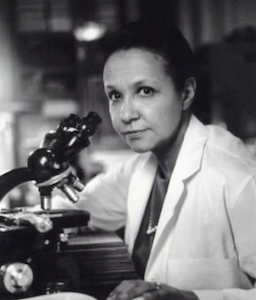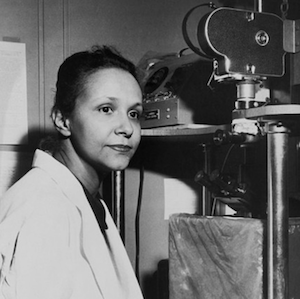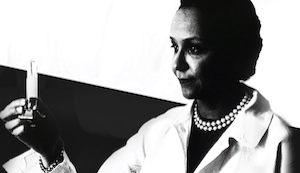
Jane Cooke was born on November 20, 1919 in New York City. Her family set an excellent example for a young Jane, as her dad was the first black doctor in New York City to be employed in a municipal hospital. When she was 10, he became NYC’s first black surgeon. Additionally, his cancer research, performed in Harlem, inspired Jane and shaped her life interests. Jane’s start as a doctor began with immediate success. From New York Medical College in 1945, she graduated with Honors and, shortly after, she worked as an assistant resident for internal medicine at Bellevue Hospital. However, Jane was defined by more than just her career, since she also got married and had her first child during her residency at Harlem Hospital. Although people might expect that her family life would cause her to make sacrifices in her career, Jane would prove them completely wrong. She was selected as chief resident and, soon after, in 1949, she continued her career with full force as a physician for New York City Public Schools and Harlem Hospital. Afterward, she returned to her family’s roots studying cancer, working closely with her father.
When Jane began working with her father, he had already made progress with the Cancer Research Center at Harlem Hospital, researching chemicals to fight cancer. Jane quickly filled a role running patient trials, and together, they seamlessly tested a chemical that dealt with leukemia and lymphatic cancers. They performed this research up until her father’s death, when Jane then became the head of the foundation. At this point, Jane was only 33, which was a young age to be so successful in the field of medicine.

A trend of youthful success continued, and Jane became an associate professor of surgical research at New York University (NYU) at age 36. After pursuing teaching for nearly ten years, Jane was appointed to the President’s Commission on Heart Disease, Cancer, and Stroke by Lyndon B. Johnson. Ultimately, however, she returned to her Alma Mater, New York Medical College as a professor, Head of the Cancer Chemotherapy Department, and Associate Dean. She had so much responsibility, and yet found the time to conduct private research, and even pioneer programs for further research and instruction.
Throughout her career, Jane’s gender and race made her career all the more impressive, because she lived during a time when both served as obstacles in the workfield. She was the first female president of the New York Cancer Society and was the highest ranked black woman at a nationally ranked medical institution. Additionally, Jane was one of the first few to conduct modern mainstream research. At the time, using drugs to treat cancer was considered highly experimental and was rarely done. So, when Jane and her father began patient trials and research, they laid the foundations to numerous future discoveries, such as how to treat tumors with chemotherapy.
Jane died on February 19, 2013 from dementia. However, her legacy still stands in the works and programs she pioneered. Along with 135 research papers, Jane also left behind delegations of researchers all around the world, each aimed toward fighting cancer with groundbreaking research. Awards were even renamed in her honor, such as American Society of Clinical Oncology’s Young Investigator Award, which provides research funds for post-fellowship doctors, to jumpstart their career into faculty appointments. As the only female founding member of the organization, Jane was well deserving of this honor. Whether it was in a university or hospital, or even on news reports, Jane’s intellect and determination shined a bright, inspirational light toward all black female doctors.

Jane died on February 19, 2013 from dementia. However, her legacy still stands in the works and programs she pioneered. Along with 135 research papers, Jane also left behind delegations of researchers all around the world, each aimed toward fighting cancer with groundbreaking research. Awards were even renamed in her honor, such as American Society of Clinical Oncology’s Young Investigator Award, which provides research funds for post-fellowship doctors, to jumpstart their career into faculty appointments. As the only female founding member of the organization, Jane was well deserving of this honor. Whether it was in a university or hospital, or even on news reports, Jane’s intellect and determination shined a bright, inspirational light toward all black female doctors.
Why Did I Choose to Research Jane Cooke?
I’d found out about Jane Cooke in a book I was reading about amazing women in science, and she stood out to me as the paragon of humility and effortless success. Despite groundbreaking research and over a hundred research papers, Jane was still very down-to-earth and worked to help others reach her level of success in their careers. To me, that spoke of a strong character, not just a strong doctor.
Works Cited
National Institutes of Health. (2015, June 3). Changing the face of Medicine | Jane Cooke Wright. U.S. National Library of Medicine. Retrieved September 20, 2021, from https://cfmedicine.nlm.nih.gov/physicians/biography_336.html/.
Morgan, S. (2021, September 17). Young investigator award. ASCO. Retrieved September 20, 2021, from https://www.asco.org/career-development/grants-awards/funding-opportunities/young-investigator-award.
Celebrating black history month - Jane Cooke Wright. Celebrating Black History Month - Jane Cooke Wright | Molecular Biophysics and Biochemistry. (2021, February 24). Retrieved September 20, 2021, from https://mbb.yale.edu/news/celebrating-black-history-month-jane-cooke-wright.
Weber, B. (2013, March 3). Jane Wright, Oncology Pioneer, dies at 93. The New York Times. Retrieved September 20, 2021, from https://www.nytimes.com/2013/03/03/health/jane-c-wright-pioneering-oncologist-dies-at-93.html.
This article was published on 3/15/2022